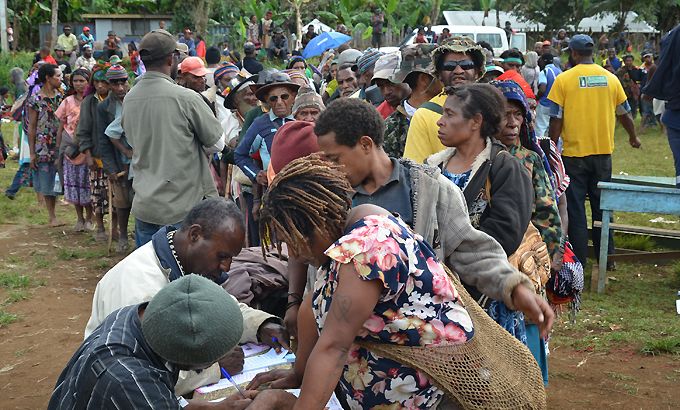Papua New Guinea goes to the polls
About 3,500 candidates are vying for 109 seats in an election that comes after months of political uncertainty.

Voting have begun in Papua New Guinea (PNG) in the first day of voting in polls seen as a watershed moment after months of political uncertainty in the struggling Pacific nation on the brink of a huge resources boom.
Voters hope the two-week-long election will end a prolonged political crisis which has left the South Pacific archipelago with two competing prime ministers for much of the past year after parliament backed Peter O’Neill, defying the courts which supported elder statesman Michael Somare.
PNG’s electoral commission said voting started on Saturday between 8am and 9am local time (22:00-23:00 GMT on Friday) in a number of provinces across the rugged nation, with the full count expected to take two weeks.
Elections are highly charged events in PNG, an often volatile Melanesian country of 6.5 million people with 700 language groups, covering 600 tropical islands and a mainland divided by the rugged mountains of the volatile highlands region.
Alphonse Muapi, a commission spokesperson, said the lead-up to the election had been mostly peaceful and the morning’s voting had started without a hitch.
Security forces were deployed across the nation, particularly in the volatile highlands where a number of pre-polling raids and arrests were made and which was the scene of violence in 2002 polls.
There are 4.6m people registered to vote, and 3,428 candidates vying for 109 parliamentary seats, with no single political party likely to win enough seats to form a government on its own.
There are 4,700 polling stations, 1,700 of which are so remote that they are only accessible by air.
The vote is seen as the most crucial in PNG’s 37 years since independence, with the country poised for a more than $15bn liquefied natural gas (LNG) project set to transform its impoverished economy.
‘Dysfunctional blob’
Corruption and bribery are common in the aid-dependent Melanesian nation of 6.8m people, with diplomats describing PNG as a “dysfunctional blob” and “steeped in traditional magic” in memos published by WikiLeaks last year.
A backgrounder prepared by US officials ahead of the last elections likened the country’s politics to “Ponzi” fraud schemes and described its citizens as “rubes”, or country bumpkins, whose votes were easily bought.
Election observers said vote-buying was even worse this time around, with bribes on offer increasing as much as 30-fold in some areas as contenders jostled for a position in the front seat of the resources boom.
“Our team in Enga has reported that certainly one of the sitting members [of parliament] has been handing out debit cards with 3,000 kina [$1,445] in the account,” said Nicole Hayley, head of the Domestic Election Observers group.
“Clearly this election is much more competitive and people are crediting that to the liquefied natural gas project. The stakes are much higher,” said Hayley, from the Australian National University.
Due for completion in 2014, the $15bn ExxonMobil LNG project stands to end PNG’s reliance on foreign aid, potentially doubling the nation’s GDP.
Wrangling over the project’s spoils has been seen as the key driver of a power struggle between veteran leader Sir Michael Somare and would-be successor Peter O’Neill, which has plunged the nation into a protracted political impasse.
O’Neill was installed as prime minister while Somare was ill in Singapore last year, but the supreme court ruled in December that the man known as the “Grand Chief” had been wrongly toppled.
The decision triggered a crisis which, at its height, saw the nation with two prime ministers, two governors-general and two police chiefs.